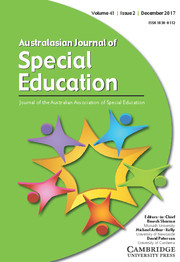No CrossRef data available.
Article contents
Assessing the Strengths and Needs of Minority Parents
Published online by Cambridge University Press: 26 February 2016
Abstract
The Parental Strengths and Needs Inventory was administered to 60 Black mothers and their preadolescent children. Most of the mothers, despite a lower than average income, formal schooling and family stability enjoyed being parents, successfully performed the tasks expected of them, and effectively taught essential lessons about life. In the estimate of themselves and their children, these mothers qualify as good parents. Both generations identified similar and differing aspects of maternal behaviour that should be improved. Youngsters contradicted their mothers regarding how well the adults handled certain problems associated with childrearing. Significant differences between the groups were obtained for some of the inventory items, with children commonly assigning lower ratings to the mothers than mothers assigned to themselves. Becoming adequately informed about the growing up experience of individual sons and daughters was identified by both generations as the mothers’ most prominent weakness. The findings offer a generally favourable view of maternal competence in Black families and is being used to develop a suitable curriculum for mothers.
- Type
- Research Article
- Information
- Copyright
- Copyright © The Australian Association of Special Education 1990




